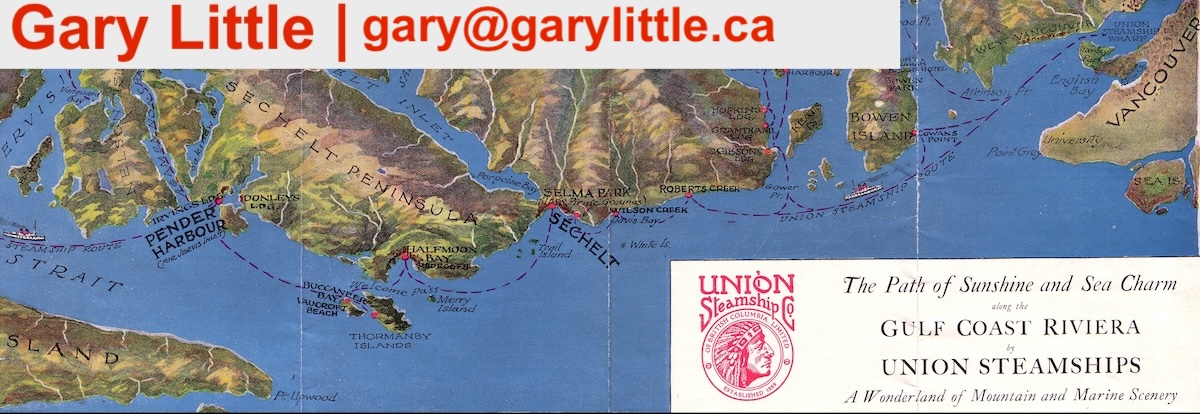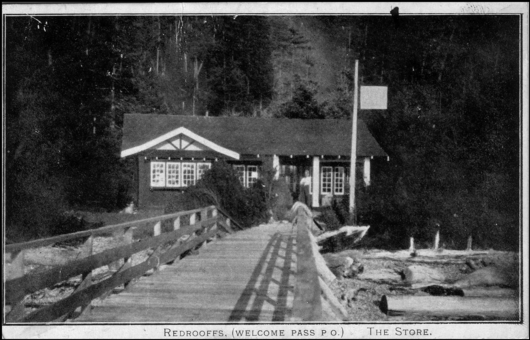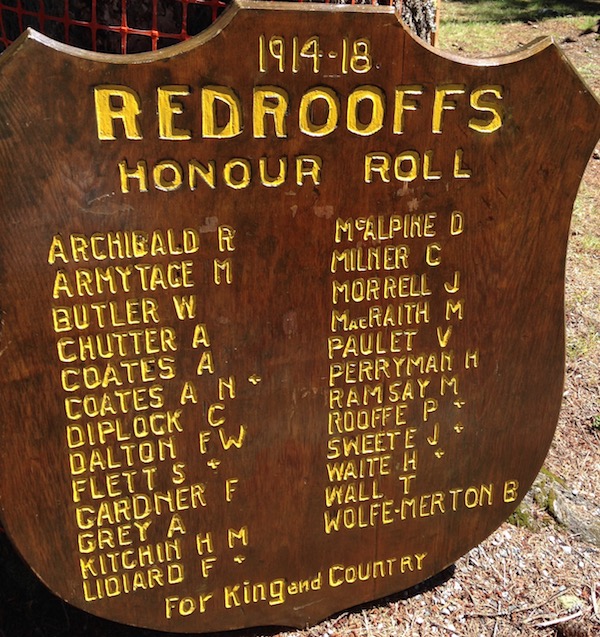Sechelt, BC V0N 3A0
Canada

|
#201 - 5760 Teredo St
Sechelt, BC V0N 3A0 Canada |

|
|
Redrooffs Memorial for World War I Veterans
SECHELT, BC — OCTOBER 11, 2007 — Local real estate agent Gary Little has tracked down another interesting document relating to the early history of the Halfmoon Bay area. (See www.garylittle.ca/pr-20060629.html for his 1911 "Half-Moon Bay" map discovery.) It is a typewritten document, probably written around 1963, titled The Store at Redrooffs. In it, the writer reminisces about his activities at the new Redrooffs Resort in 1913 and 1914, and includes interesting comments on the "Redrooffs Honour Roll" — a memorial plaque for the Halfmoon Bay men who served Canada during World War I 1914-18. The Redrooffs Resort was located at the present day site of Coopers Green and although it is now long gone, its name lives on to identify the coastal road through Halfmoon Bay. The old document is not signed, but an educated guess is that the writer was Chris Dalton, son of Frederick W. Dalton, a Halfmoon Bay pioneer whose name appears on the Honour Roll plaque mentioned in the document. It was recently found in the business papers of Jim Cooper, who passed away in 1977, by his daughter Patty Cooper Hilton. Cooper acquired the Redrooffs resort in late 1945.

Redrooffs Store ca. 1914 (Courtesy of Sechelt Community Archives)
I do not know when the Store was built, but in my experience of Redrooffs, which begins in the summer of 1913, it was certainly there; and until the coming of the road and cars from Gibsons Landing was always the focal point for the inhabitants of Redrooffs during the summer months.
In the early days, in 1913 and 14, the steamer from Vancouver, after a rather interminable journey, drew alongside a float, somewhere off the end of the present wharf, of bare logs. Families disembarked on this float, with their children and belongings; if their freight included a rowboat, it was dropped into the sea from the steamer, and someone jumped in and rowed it around the ship to the float; the family them embarked in the rowboat, with as much of their belongings as could be loaded, and proceeded under oar-power to the Store. Well do I remember our first landing on the float and voyage to the Store; my father succeeded in neatly putting us on top of the rock, which is at present marked with a piece of pipe, much to the consternation of my mother and a nurse who accompanied her to look after the children. Those families without a rowboat simply waited on the float until someone from the Store came out to take them and their belongings ashore. At that time the Store was inhabited by one Ben Powell — reputedly a nephew of Sir R. Baden-Powell. His duties were numerous; to look after the Store, to ferry to the correct beach the baggage of arriving families (and to take the same baggage out to the float again on their departure), to row across the bay each morning to Newlands for milk and eggs. Consequently the hours of opening of the Store were quite indefinite; in fact the Store was open at times when Ben Powell had nothing else to do. On our arrival in 1913, after freeing ourselves from the rock, we were met on the beach in front of the Store by Mr. Hubert Kitchin, one of the owners of the resort. He directed us to row up to no. 5, which was open, and informed us that our baggage would be delivered on the beach in front of the house in due course. For this purpose Ben Powell resorted to a long flat-bottomed rowboat; this he would navigate in leisurely style, piled to the gunwales with assorted baggage, with a line out astern for an unsuspecting salmon, which he usually managed to catch; and in due course he would arrive at the shingle beach opposite to the new arrival, and unload the baggage. The rest was up to you. We children used to wait for hours longing to get into the water, but not allowed to until Ben Powell arrived with the baggage and our bathing suits. It must be remembered that at that time only six houses existed, so that the arrivals and departures cannot have been too frequent. After a year or so of this, I seem to remember that the owners of the resort realized that the Store could be a profitable operation; the hours of opening were regularized, and a barrel of real cider was installed, with somewhat unfortunate results, and it was never replaced. About this time Mrs. Kitchin took to helping in the Store, and when she became Mrs. Milne to spending much of her time there. But before that transpired, Hubert Kitchin decided on expansion; more houses were to be built among the six already there, and when that was done, and the place was considered full, beaverboard houses were constructed 'round the point' towards Duck Rock. All this with a view to increasing the business of the Store, which by now it was realized could be made a major source of revenue. An assistant to Ben Powell was obtained, an old Guardsman by the name of George King. His duties were very many and varied, and by the time he was able to relax on a bear-skin rug in Ben Powell's quarters adjoining the Store in the summer months he had really done a day's work; from splitting wood, rounding up and milking cows, rowing an enormous lifeboat from the wharf, as it now was, to the appropriate beach piled high with baggage and ferrying supplies to the Store. The era of gasoline engines was now making itself felt, and the Store had to sell gasoline. A bridge was built from the Store to the Island and facilities for the sale of gasoline and oil installed there. Hubert Kitchin decided that some form of transportation must be provided for the settlement round the point in order to get to the Store, and bought a very old Columbia River flat-bottomed fish boat, complete with engine. I was offered the job of commanding this boat, being in one Captain, Engineer, Purser, and Deckhand for $10.00 per month, to run the boat on a regular schedule to the settlement round the Point, and to meet all incoming and outgoing steamers; and to collect a fare of 5¢ per passenger to or from the Store. For ten days I struggled to get the engine to function while Hubert Kitchin paced up and down on the bridge to the Island shouting 'when is that damned boat going to sail?' I made two round trips to the far settlement, landed one party of old ladies up for a Sunday afternoon visit on the rocks, and gave up in disgust; the engine just was not reliable. I was demoted to the old lifeboat and baggage and stores, and spent hours and hours trying to row this old boat from the wharf to the Store. But I did get my $10.00 per month. In those days, if passengers wanted the down boat to stop, a flag was hoisted on the Island. If the boat saw the flag, after a very long time she would turn, and the passengers would be embarked in rowboats and taken out to meet the boat; there was no nonsense about wasting time by going to the float or wharf.

Redrooffs Honour Roll 1914-18 About this time, Denzil Kitchin, the younger son of Hubert Kitchin, decided to mobilize the Half Moon Bay Guides; an assortment of young male summer residents, which before long included practically all those of eligible age. Parades were held each weekday morning on the field adjoining the Store; and woe befall any unfortunate member who did not turn up for parade without a sound excuse. A good deal of drilling took place interspersed with maneuvers both ashore and afloat. The Kitchin family possessed a large and very beamy rowboat; this was fixed up as a galley, with four oarsmen, each pulling one oar, under a sort of canopy. The skipper, Denzil Kitchin of course, had built himself a sort of poop at the stern, from which he issued commands and did the steering, Besides cruising about the bay and trying to get through all the narrow passages available without scraping an oar or the bottom of the boat, any small boys out in their boats who were not members of the Guides were considered fair game. These we would endeavour to ram and upset; of if that was not possible their oars would be taken from them by a boarding party and they would be left adrift. On land a fort was built on top of a rock on the far side of the lagoon, and once a year it would be defended against the male population, of all ages, the ammunition being green fir-cones and gallon cans of water. After parades the Company was usually taken to the Store and given light refreshments, presumably 'on the house.' Hubert Kitchin passed away, and in due course Mrs. Kitchin became Mrs. Peter Milne, with Peter Milne becoming very active in the management of the Store and the Redrooffs Trading Co. Ltd. which was the company owning the property. The settlement round the point was abandoned, and the beaverboard houses moved down behind the Store around the Lagoon. The tennis court behind the Store was improved, a sort of Community Hall was built near the Store, available for dances, badminton and so forth; the post office was installed at Redrooffs, and a telephone and more than ever the Store became the centre of social life. Gone were the days when a pound of bacon or cheese was cut according to guess — usually in the customer's favour. These commodities were now cut and then weighed, and the smallest overweight was shaved off — what became of it I do not know. The Store was open practically all day, and was obviously a profitable operation. Mr. Milne supervised the operation very closely and Mr. Ben Powell retired to England, his place being taken by a Thomas Beasley. Today there are a very few rowboats at Redrooffs; no one in their right mind would think of rowing across to Bear Rock, spending the night there, and getting up early in the morning to fish; the Redrooffs Trading Co. Ltd. has vanished, the houses are all individually owned, and there are many more of them. The road has come in from Gibsons Landing, and there are no longer any up or down boats or flags to signify that someone wants to go down to Vancouver. But still the Store is there, somewhat dilapidated now, and no longer quite the centre of the summer social life; the bay hums with the noise of fast motorboats, and sometimes airplanes. No one is ever seen rowing a boat, and perhaps no one ever glances at the Honour Roll on the Store front. And finally I learn that the Store is to be pulled down. I hope that some spot will be found in which to preserve the old Honour Roll. Perhaps somewhere in the vicinity of the spot where the sons of those names on the Roll built a fort might be a suitable place. In 1964, shortly after this document was apparently written, the original Redrooffs Store, built around 1912, was pulled down by then owner Jim Cooper. The Honour Roll plaque, by this time damaged by exposure to the elements, was removed and remained in storage until about 1972 when it was carefully restored and donated to the Welcome Beach Community Association. It is now displayed prominently inside the Community Hall at 8394 Redrooffs Road. For more information about this document, contact Gary Little at gary@garylittle.ca or visit his Web site at www.garylittle.ca.
Update: In October 2011, the Welcome Beach Community Hall property at 8394 Redrooffs Road was sold. The Honour Roll plaque has been safely placed in storage and is awaiting a new home.
Gary Little is a realtor® and licensed real estate trading services representative in the offices of Royal LePage Sussex in Sechelt, British Columbia, Canada. He is a former senior software marketing manager, having previously worked in Silicon Valley for almost 20 years at the worldwide headquarters of Apple Inc. and Sun Microsystems, Inc. He is well known for his interactive real estate map of the Sunshine Coast (map.garylittle.ca).
CONTACT INFORMATION
Gary Little, realtor® This news release is located online at: http://www.GaryLittle.ca/pr-20071011.html |